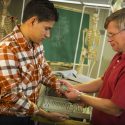Course adds to environmental awareness
For many kids, a trip to the beach conjures up memories of sand castles and sunscreen. Todd Goddard remembers the medical waste on the Jersey shore.
“I was almost completely clueless about renewable energy, but I cannot stress how much I learned. I also learned how to incorporate renewable energy, politics, and politeness into a strong, concise letter to the editor. So far, I’ve been published in the Milwaukee Journal Sentinel and The Capital Times.”
Jordyn Poad
“I’ll never forget those beach-closing warnings. I remember waking up and listening to the radio to hear which beaches were OK. We’d walk down to the beach and see hypodermic needles and gauze bandages sticking out of the sand. Ships would just dump it off the coast.”
Now a Ph.D. student in literary studies, Goddard has found a way to unite his concern for the environment with his teaching. In his section of English 201, he provides 16 students with real-world communications experience while giving 11 local nonprofits some much-needed help. In the process, he helps increase environmental awareness among his students and the audiences they serve.
While other writing-intensive courses may emphasize composition skills within a particular discipline (such as literature), the 13 sections of English 201 each use a distinct theme to relate the same goal: providing intermediate composition students with the opportunity to develop skills in reading, writing, speaking, and listening. Several sections of 201 involve service-learning components.
In addition to providing a comprehensive experience for students, it also allows experienced teaching assistants the flexibility to design and create their own courses — a crucial skill for those aiming for an academic career. For Goddard, English 201 offered the perfect way for him to lead a service-learning course. He applied to teach the course in the spring of 2008 with a proposal to the course’s director; this spring marks his second semester at the helm.
As he sought service-learning partners, Goddard discovered that many environmental organizations faced the same questions and challenges that his students faced in class. How do writers use writing and rhetorical strategies to influence various audiences? How can organizations package a message to diverse readerships in diverse media in diverse ways?
“Several groups said, ‘Wow, that’s a perfect fit. We face those questions every day, and they’re some of the most challenging things we face,’” recalls Goddard. “They communicate those ideas to experts, boards of directors, the general public and potential donors. They’re using e-mails, newsletters, brochures, Web sites, everything; they always have to adjust how they write about their ideas.”
In the classroom, Goddard uses classic environmental texts and documentaries as springboards for discussion, choosing writers with a wide range across the 20th century. While Rachel Carson’s mid-century masterpiece “Silent Spring” has a specific target and an activist bent — inciting its readers to change — Annie Dillard’s more recent “Pilgrim at Tinker Creek” presents a less strident slant while focusing intently on a sense of place. Wisconsin’s own Aldo Leopold’s “Sand County Almanac” splits the difference, interweaving the story of his farm with an ending polemic on the state of the land. Goddard values not only the variety of examples but the depth of interaction.
“There are no sacred cows in class. They’re not afraid to really challenge authors, their ideas and their styles. We get into some heated and intense discussions.”
By all accounts, this combination of reading and writing has proven a success. For tiny nonprofits with few staff members, the help is invaluable; they return the favor by eschewing busy work and giving students active roles — roles that have paid off.
“Last semester, I had students in different organizations all working to some extent on the same issue,” says Goddard. “Toward the end of the semester, the proposal in question was rejected, so they got a great chance to see the arc from the beginning of the semester to the end. I think they felt a pretty intense sense of accomplishment from having participated, and from seeing how that process worked — influencing a broad audience and a smaller audience, like the boards that were deciding this issue, to prevent a substantial change.”
Students agree. Jordyn Poad had barely arrived on campus as a new transfer student when she found herself immersed in volunteer work for Clean Wisconsin. Despite the challenge of acclimating to both a new campus and an organization she knew little about, she deeply appreciates the support she’s received in and out of class.
“I was almost completely clueless about renewable energy, but I cannot stress how much I learned,” says Poad. “I also learned how to incorporate renewable energy, politics, and politeness into a strong, concise letter to the editor. So far, I’ve been published in the Milwaukee Journal Sentinel and The Capital Times.”
“Todd put this together all on his own. He’s amazingly committed,” says Mary Fiorenza, coordinator for English 201 and herself a former 201 instructor. “Students look for his class now; some of them don’t necessarily know what they’re in for, but as they get acclimated they really dig in.”
For Fiorenza, this kind of experience cements the aims of English 201.
“Todd gives his students a real audience to write for, not just an imagined one. It’s great.”



